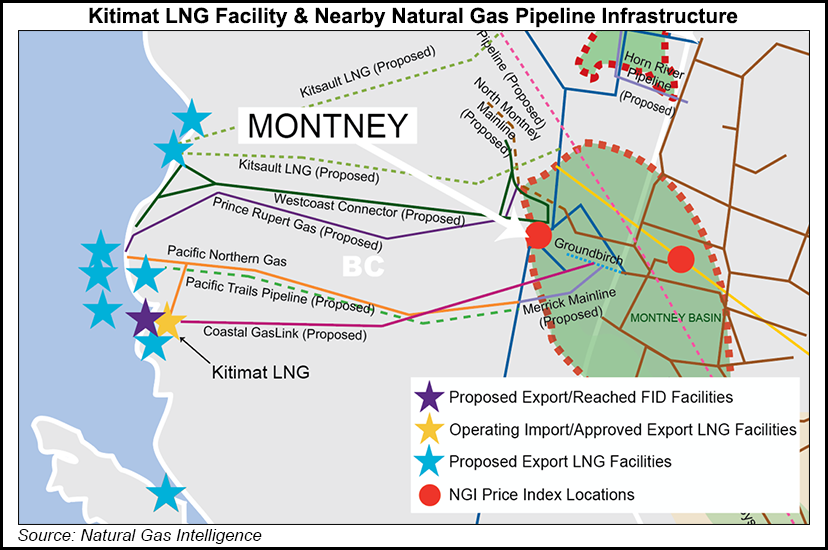Infrastructure | LNG Insight | NGI All News Access | NGI The Weekly Gas Market Report
Chevron, Woodside OK’d to Export 2.7 Bcf/d from KM LNG Facility in British Columbia
Chevron Canada Ltd. and Woodside Energy Ltd. have received approval to double the size and planned lifespan of KM LNG, their proposed natural gas export project to be sited in British Columbia (BC).

The Canada Energy Regulator (CER) granted the partners a 40-year license to export 35 Tcf of liquefied natural gas (LNG) at a rate of up to 2.7 Bcf/d from the still unsanctioned Pacific coast terminal at Kitimat in Bish Cove.
The new license replaced a previous 20-year approval for 1.3 Bcf/d that was to expire at the end of this month. The new ruling also granted the facility a 10-year period to build the terminal and the proposed supply conduit, Pacific Trail Pipeline. The project has federal and provincial environmental approvals, a terminal site lease and a benefits agreement with the Kitimat native community.
Time allowed for the project starts on the day the federal cabinet ratifies the CER ruling. Chevron and its Australian partner have not disclosed construction schedules, costs or gas supply arrangements for the evolving, enlarged second edition of KM LNG.
Costs of the original project were estimated at C$5.6 billion ($4.2 billion), including C$4.5 billion ($3.4 billion) for the Kitimat terminal and C$1.1 billion ($825 million) for the pipeline from northern BC gas wells.
During the application procedure for the new export license, Chevron and Woodside said expanding KM LNG was necessary to improve the prospects of competing for global markets by spreading costs thinner over increased production volumes.
Environmental and economic objections were rejected. The environmental effects are to be considered in federal or provincial reviews of facilities proposed to use the license, said the CER.
Chevron described the evolving second version of the project as LNG that would cut carbon emissions by using electricity from provincial government-owned BC Hydro’s northern dams.
Native consent has been secured by cooperation and benefits agreements with the Haisla Nation at Kitimat and all 16 tribes along the planned pipeline that would span 471 kilometers (283 miles) of northern BC.
The west coast of Canada has several export projects in the works, with the Royal Dutch Shell plc-led LNG Canada project also to be sited in the Kitimat region sanctioned and underway.
In addition, the proposed Cedar LNG export project in September set a target of mid-2025 to begin overseas shipments from Kitimat. Haisla Nation in government filings predicted the export outlet for 400-500 MMcf/d could be built for C$1.8-2.5 billion ($1.4-1.9 billion) on its tribal territory at Kitimat, 650 kilometers (390 miles) northwest of Vancouver.
The Cedar site is about five miles from the Royal Dutch Shell plc-led project already sanctioned and underway. The Haisla want a link for Cedar to LNG Canada’s related Coastal GasLink supply pipeline, which is being built to carry up to 5 Bcf/d.
© 2024 Natural Gas Intelligence. All rights reserved.
ISSN © 1532-1231 | ISSN © 2577-9877 | ISSN © 1532-1266 |
